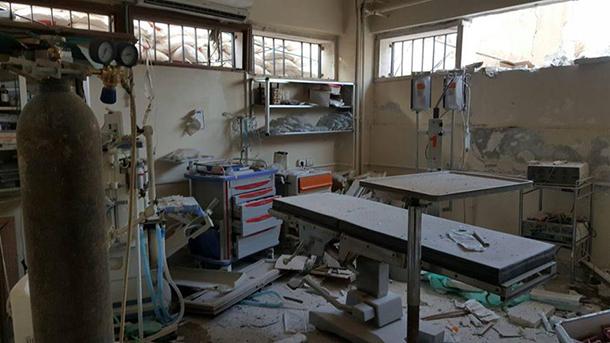Where We Work
See our interactive map


Aftermath of an attack on a health facility in Aleppo, Syria. Photo courtesy of the Syrian American Medical Society (SAMS), a member of the Safeguarding Health in Conflict Coalition.
IntraHealth International, as co-secretariat of the Safeguarding Health in Conflict Coalition, applauds a new declaration by France and 11 other UN member states to take concrete actions to protect health workers in conflict areas around the world.
A report by the coalition documents attacks on health workers or facilities in 23 countries in conflict or political unrest last year. Health workers were arrested, assaulted, kidnapped, punished, and even killed just for doing their jobs. The report also finds that accountability for committing these attacks remains inadequate or non-existent.
In 2016, there were attacks on health workers or facilities in 23 countries in conflict around the world.
At a meeting hosted by the France UN Mission on October 31, the coalition joined member states and others to discuss measures needed to implement UN Security Council Resolution 2286. Adopted in May 2016, the resolution set out a roadmap for the protection of health workers and facilities globally, which have come under increasing attack in recent years. So far the UN Security Council has failed to enforce the resolution.
Eleven states—Spain, Italy, Japan, Kazakhstan, the Netherlands, Peru, Senegal, Switzerland, Uruguay, Canada, and Ukraine—endorsed France’s non-binding declaration, promising to “take practical measures to enhance the protection of, and prevent acts of violence against, medical and humanitarian personnel, and to better ensure accountability for violations in accordance with our obligations under international humanitarian law.”
In particular, these states will:
The Safeguarding Health in Conflict Coalition welcomed France's strong call to action. “These steps are essential to realize the promise of Resolution 2286,” said Susannah Sirkin of Physicians for Human Rights, a coalition member, “Especially after 18 months of inaction at the Security Council.”
The Safeguarding Health and Conflict Coalition disseminated eight concrete steps states can take to implement Resolution 2286. These include an annual review by all member states of the resolution's failure and successes; the absolute prohibition of the criminalization of medical care; and a clear, accurate, and credible list in the Secretary General’s annual report on children and armed conflict of perpetrators for grave violations of children’s rights, including attacks on hospitals and health workers.
The United States and the United Kingdom, both at the meeting and both permanent members of the Security Council, declined to sign on. The Safeguarding Health in Conflict Coalition urges them to endorse the declaration.
The Safeguarding Health in Conflict Coalition consists of more than 30 organizations working to protect health workers and services threatened by war or civil unrest. The coalition raises awareness of global attacks on health and presses governments and United Nations agencies for greater global action to protect the security of health care.



